Monthly Archives: November 2018
Ask Your Children Faith-Challenging Questions Before Someone Else Does
Our children will come under attack. It’s not a matter of if, but when.
How do we prepare our children for the flaming arrows of the evil one (Eph. 6:16)? Satan, from the beginning (Genesis 3:1-6), has sought to create doubt about the Creator God’s goodness, which ultimately results in unbelief.
How many children have been brought up in a loving and caring family that is faithful to Jesus and his people, and are then exposed via the Internet, a difficult life moment or in a university class, to a question or worldly doctrine that completely destroys their faith? How do we prepare our children for that?
What we can’t do is wall them off or hide them from the world in a tower. We can’t perpetually protect our children from the trust-eroding questions that are going to come with regard to God and His word. We can’t shelter them from the hard questions that a broken and evil world often produces.
So what is to be done? I want to propose one strategy in which we carefully vaccinate them so as to build up their immunity to the destructive schemes of the enemy.
You likely know how vaccinations work in theory. Those we wish to protect are exposed to a controlled and modified dose of the disease we wish to avoid, and the recipient builds up an immunity or a protective defense against that which can harm and destroy.
Similarly, I propose we ought to prayerfully and carefully expose our children to the kinds of questions and problems that they will eventually have to face. In this way, we control the dose and the environment so that we build up confidence in God’s word. Think about it, would Christian parents rather their teenager consider the problem of evil with their help, or with the help of the atheist prof in an introduction to philosophy course? Would we rather them hear it from us first, or be completely blind-sided by a stranger or someone who does not have their best at heart?
Consider the message we are sending when we take this proactive approach. In essence, we are saying we believe in the strength of the message we espouse. If we try to hide or avoid the challenges to our faith from our children, then they may become suspicious that we don’t believe the Christian worldview and that it can’t stand up to the arguments of the world. I propose we be honest that this world is complicated and hard to understand because of the brokenness and chaos that sin has wrought. To be clear, I don’t want us to overdose our children with the poison of unbelief, but we must show that our faith is a confident and thinking faith. We must also declare the message that the Christian worldview can withstand the attacks and scrutiny because we trust the creator God who gave it to us and the Jesus Christ is the final answer about God’s love and justice.
As an example, this morning someone posted on the Facebook the video below of Ravi Zacharias. I found it to be a cogent response to an age-old question regarding the problem of evil and suffering. The person asks a question that goes something like: “Why doesn’t God stop evil by stopping the person who is pulling the trigger to murder? If God is just and good, why does he allow evil?”
Having watched the video, and found it to put forth a sold response to a potentially faith-crippling question, I asked my teenage son to watch it on our way to school. Then after it was over, we talked about the problem and the answer. And then I prayed for God to protect my own heart and the heart of my son from the one who is a liar from the beginning (John 8:44) and seeks to steal, kill and destroy (John 10:10). Truly, my best ideas are useless without God’s merciful work upon the heart and mind (John 15:5).
I share this strategy with much trepidation because I don’t know what the outcome will be with regard to my efforts. I also don’t presume this is a one-size-fits-all approach. But I refuse to sit back and wait for the enemy to dictate the conversation and frame all the questions to his advantage. I want to do all I can to prevent a blindside sneak attack that none of us are prepared for. I have faith that our biblical faith, rightly understood, can stand up and shield us from the flaming arrows. I would rather say that I tried and failed, than to have failed to try.
The enemy will attack. What is your defense? What is your strategy?
The video is worth the 6 minutes it takes to watch.
Gender Fluidity Education and Respectfully Disagreeing

When I take my fourteen-year-old to school in the morning, we often listen to NPR. It affords me a moment to catch up on the local and national news, but I have discovered there is another benefit; namely, that it creates some interesting dialogue with my teenager.
This morning we were in route and we listened to a segment: “5 Ways to Make Your Classroom More Inclusive”. The title is self-explanatory enough, but so as to be clear, the segment tells the story of several teachers who are trying to make their classrooms a safe place for gender uncertainty or fluidity. For example, one teacher in Colorado “goes out of her way to address gender identity in her classroom” so that LGBTQ children are not bullied. The article goes on to suggest strategies for making the classroom more friendly to all gender possibilities. For example, teachers should not use identifiers like “boys and girls” for “ladies and gentlemen”. Instead, it is better to use terms like: “scientists” or “athletes” or “scholars”.
So we listened to the whole show and when it ended I turned the volume down and asked my son: “So what do you think about that?” He responded with a strong opinion that I would expect from someone his age. There was not much nuance, just a blunt and certain answer. I pushed back: “You don’t think there is something to learn from what we just heard?” I hope I surprised him with my response because here was the gift of a teachable moment.
I believe strongly that the substance of my son’s moral response was right on, but the way he said it needed some refinement for the sake of loving God and his neighbor with his whole being (Matthew 22:36-40).
I explained to him that there is a lot of confusion in the world today and that it was my opinion that attempts like this one only contribute to the confusion of very young children and those who are mentally and physically still developing. I further said to him that it is fine to strongly disagree with the preferences and opinions of people and that it is possible to disagree with others without hating them. But on the other hand, I explained that there is something to be learned from the article: All people are worthy of dignity and respect, regardless of whether we agree with them or not.
To be crystal clear, I would not want my six-year-old or my twelve-year-old to be taught what these teachers are specifically teaching about gender fluidity. That should be left to parents. But generally speaking, we must teach our children that all people are created with intrinsic human rights (created in the image of God) and deserve to be treated with kindness and human dignity. For instance, directing phrases at others like: “that is so gay” or using others slurs is intentionally disrespectful. It is using a term to belittle and demean. Mocking or ridiculing someone for their preference is wrong. Dehumanizing people is wrong, even if they are in fact wrong. Further, we should stand up for people who are being dehumanized, even if we find that we strongly disagree with them about why they are being dehumanized.
Again, I might strongly disagree with a person’s choice or opinion, but I can still treat them with respect and even defend them when they are mistreated or marginalized. If Christians wish to be light in the world, we must stand with conviction on the truth of God’s word. However, we must do it with a measured response that both honors the truth and the person who has innate dignity because of the truth that God has spoken about them (Genesis 1:26-28).
It should be said that no matter how nice you are about how you treat people when you disagree with them, it does not mean that you should expect the same courtesy in return. If you stand for the truth, then you can expect to be ridiculed and even hated. Jesus said as much. But aren’t we to love our enemies? Love does not mean agreement, but it does mean we honor the God-given humanity of people in our disagreement, and we must teach our children to think and do the same. That’s all I really mean to say. I hope you agree. But if you can’t, I hope we can keep it respectful.
To Nepal and Back Again
On Saturday, October 27th I set out from Stillwater Regional Airport to travel half way around the world and back again. Here are some of the highlights and some reflections on my time there and back.
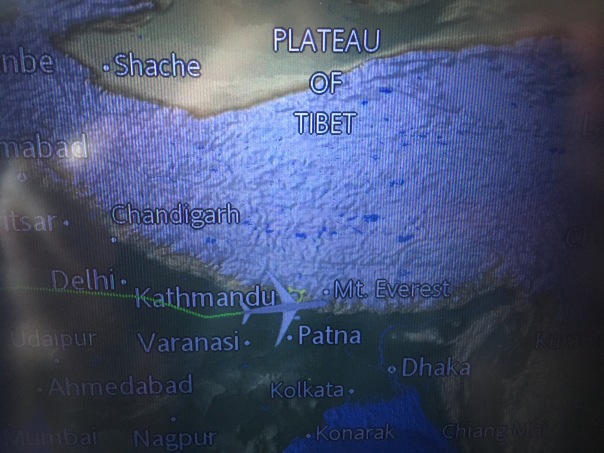
the airplane map on our approach to Kathmandu
MINISTRY IN NEPAL
After spending a brief time in Kathmandu, we traveled by car to Pokhara, Nepal where we met for a church planter’s retreat. There were an estimated 200 pastors and their wives as we packed at least 14 sessions of teaching and preaching into two days. My friend, Curtis Cook, taught four sessions and I taught three sessions. Several others from different churches taught the other sessions. We taught on topics like: The heart and character of the pastor, our weakness and power as we spread the message, making disciples, etc.

Pokhara, Nepal – our hotel view from the pastor’s retreat
On Friday, I flew back to Kathmandu with a Nepali brother, Simson. He and another brother, Uddhav, took me souvenir shopping, and then we went and ate some KFC that had a Nepali flavor to it.
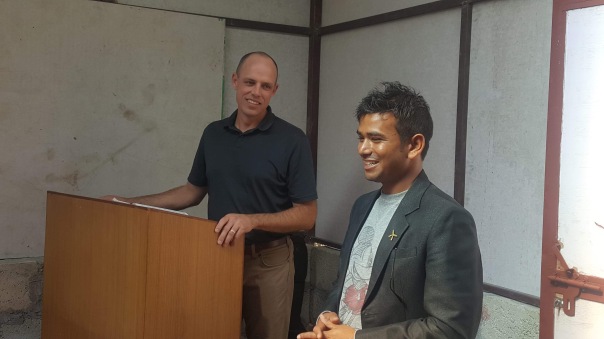
Pastor Simson doing some translation as I preach
On Saturday, I went and gathered with Pastor Simson’s local church and was privileged to preach to brothers and sisters and take the Lord’s Supper with them. They showed me the progress of their new building that was still under construction. We ended our time together in the house of Uddhav, for a very mild Nepali dinner. They then took me to the airport for my flight to Munich, Germany.
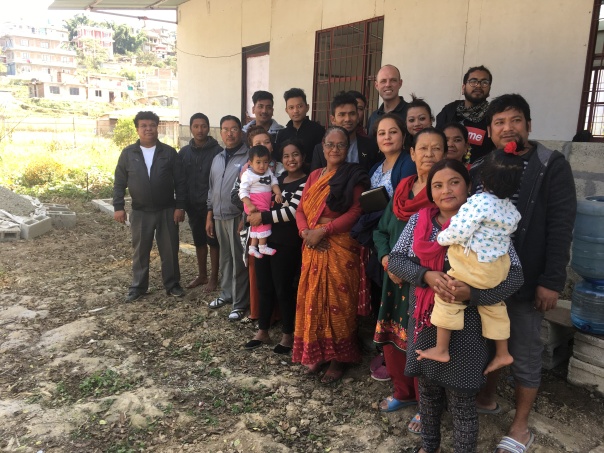
the Nepali Church I preached to
MINISTRY TAKEAWAYS
Not knowing what to fully expect from the Nepali believers, I was very encouraged with what I discovered. The Nepali pastors and their wives were very kind and appreciative of our speaking to them the word of God. They were very eager to learn, and very affirming of the teaching they received. I do believe it extended beyond some sort of reverence for the American Christians, but rather they were glad to sit for long stretches to hear the word of God taught and proclaimed.
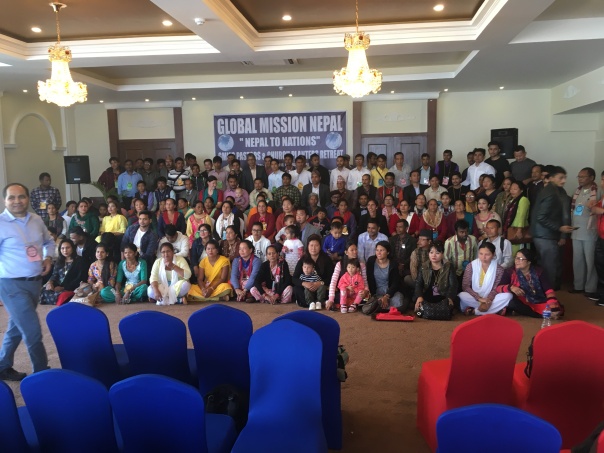
most of the Nepali Pastors and many of their wives
I was particularly pleased by what I witnessed when I gathered with Pastor Simson’s church on Saturday Morning. At the end of our time together we took the Lord’s Supper. This is the custom of this particular local church to receive communion on the first gathering of every month. When we took the bread and the cup, I noticed two young men who do did not participate. I asked Pastor Simson why they did not join us. He told me that they had not yet been baptized and they were presently a part of a class on baptism, and that until they were baptized, they did not take communion. I was highly encouraged by this thoughtful instruction and adherence to biblical principles.
I was also encouraged by the evangelistic zeal of the Nepalese brothers and sisters and their multiplication of churches. The goal of the particular group we met with was to plant 100 churches in 10 years. In under five years, this group has planted almost 80 churches. Now to be clear, they aren’t the only Christians in Nepal, and there is a lot of Hinduism and other godless forces at work, but what I witnessed was gospel-depth and gospel-zeal among the brothers and sisters I interacted with.
THREE DIFFERENT CHURCHES IN A WEEK
On Sunday, October 28th, I gathered with Hope Fellowship in Cambridge, Massachusetts and saw a vibrant church and heard a biblical and edifying sermon from the book of Esther.
On Saturday, November 3rd, I gathered with a local Nepali church and heard much praying and singing – that I did not understand, since I don’t speak Nepali. I saw them give, though I suspect they didn’t have much. I preached God’s word through an interpreter and we took the Lord’s Supper.
On Sunday, November 4th, I gathered with a local Arabic Church in Munich, Germany. Severely jet-lagged, and understanding none of what was being said, since I don’t speak Arabic, I know these things: They prayed to the same Lord of the other two churches. They sang together about Jesus. They preached and taught from God’s holy word. They gave to the work of ministry, and they took the Lord’s Supper together, remembering the body broken and the blood poured out for all who would believe.
This was an eye-opening experience as I was reminded that the gospel of Jesus Christ knows no restrictions of language or geo-political borders. The gospel must go to all the nations, and despite language and cultural barriers, it will not be contained until the task of the Great Commission is finished. These three congregations, though as different as could be in some ways, were no different in the most important ways. They worshiped the same God, using the same means because of the true word.
These three different churches were not so different.
OTHER OBSERVATIONS AND REFLECTIONS
- The traffic in Nepal is crazy scary. Whether in a car or on the back of a motorcycle, despite the confidence of the driver as he weaved in and out of traffic, I feared for my life on more than one occasion. I kept that to myself though and just prayed a lot.
- The food in Nepal is not for me. Uddhav, if you are reading this, the food we had in your home was the best I had all week. KFC was a close second.
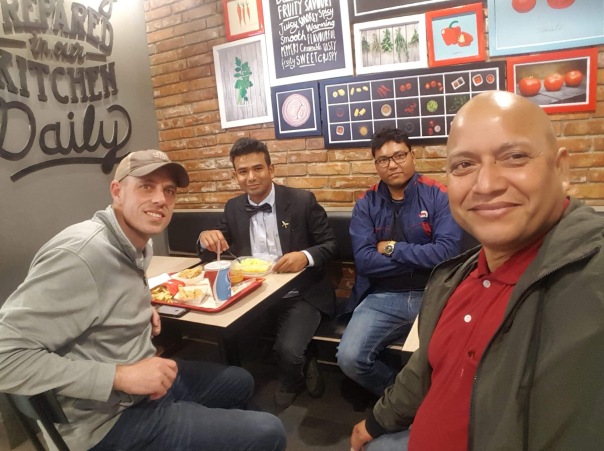
eating some KFC with my Nepali friends
- I thank God for the local church I belong to. They are gracious to be so supportive of a trip like this in which I missed two Sundays. I think it is valuable for me to be a part of missions since we are a church that heavily engages in missions, and I believe Eagle Heights recognizes this and supports their pastor going. I am also very grateful for the financial assistance I received.
- I was encouraged by our co-workers and the disciplined evangelism they are doing among Arabs in Munich. They go out every week into the city to strike up gospel conversations. They are also members of an Arab Church. I was very encouraged by our time together.

our friends at their Munich apartment
- I love my friend, Curtis Cook. Curtis invited me to go along and asked me to teach with him. One of the highlights of the trip for me was spending time with him and learning from him as he interacted with and taught the Nepali brothers and sisters. Curtis is truly a gift to me and I thank God for him.

Curtis and I at a Kathmandu restaurant
- Dachau was sadly surreal. If you don’t know, this was one of the main prisoner/concentration camps for the Nazis during WWII. Located just outside of Munich, the Nazis took an old munitions factory and around 1933 turned it into a prison camp for those who opposed the state. Later all kinds of people were sent there, including: Jews, Poles, homosexuals, Jehovah’s Witnesses, Catholic Priests,, Russian POWs, etc. Over 200,000 people were there at one time or another and an estimated 41,500 people died there. The camp was built to house around 6,000, but closer to the end of the war, there were as many as 60,000 held there. The atrocities committed there against people who were created in the image of God is a stark reminder of what the human heart is capable of in a fallen world. The Nazis humiliated, beat, starved, executed and experimented on people in this camp. The cruelty is hard to fathom.

a cremation oven at Dachau
- I have had enough of airports and airplanes for a while. Though I suppose it is better than being on a boat for months at a time.
- I missed my family fiercely and I thank God for my wife. I saved the best for last. My wife insisted I go on this trip. She supported me and told me they would be fine without me. She was so encouraging. And I missed Lacey and the kiddos. God was gracious to bring me home to the people I love the most.
THE TRAVEL LOG
Leg 1: Stillwater to Dallas and Dallas to Boston (Saturday, October 27th)
Leg 2: Boston to Doha, Qatar (Sunday, October 28th) and Doha, Qatar to Kathmandu, Nepal (Tuesday, October 30th) – From Kathmandu we traveled 5-6 hours by car to Pokhara, Nepal.
Leg 3: Kathmandu, Nepal to Doha Qatar (Saturday, November 3rd) and Doha, Qatar to Munich Germany (Sunday, November 4th)
Leg 4: Munich, Germany to Frankfurt German and Frankfurt, Germany to Dallas, Texas and Dallas, Texas to Stillwater, Oklahoma (Tuesday, November 6th)
Total time on airplanes: 49 hours
Total time in airports on layovers: Way too long